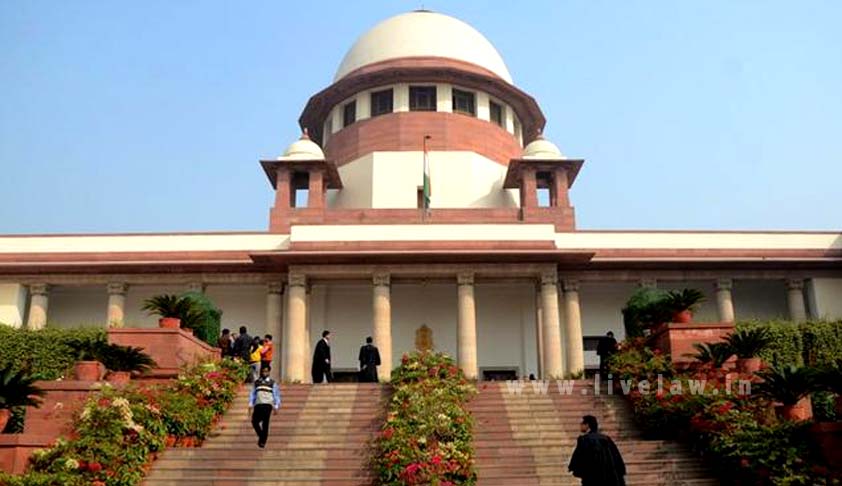To put things in perspective, the Bench then observes in para 2 that ‘The appellant was charged with the offence punishable under Sections 396 and 307 read with Section 34 of the Indian Penal Code, 1860 (IPC). The case of the prosecution is that the appellant and other accused were dacoits and were using Jayamma to lure the drivers of the lorries for illicit sex. These accused would attack the drivers and loot the goods of the lorry.’
In a welcome, wise and wonderful judgment titled Shivalinga @ Shivalingayya vs State of Karnataka in Criminal Appeal No. 1186 of 2018 delivered just recently on February 15, 2021, a two Judge Bench of the Apex Court comprising of Justice Mohan M Shantanagoudar and Justice Vineet Saran reduced the life sentence imposed on a man named Shivalinga @ Shivalingayya convicted in a dacoity cum murder case to 22 years actual imprisonment. He was convicted under Sections 396 and 307 of the Indian Penal Code and sentenced to death penalty by the Trial Court. The Karnataka High Court while partly allowing appeal converted the death sentence to imprisonment for life. It must be mentioned here that Shivalinga and other accused were in this case accused of attacking the driver and cleaner of a lorry which culminated in cleaner’s death!

To start with, the ball is set rolling in para 1 of this latest, learned, laudable and landmark judgment authored by Justice Mohan M Shantanagoudar for himself and Justice Vineet Saran by first and foremost observing in para 1 that, “Heard and perused records. With consent of both parties, the matter is taken up for final hearing.”
To put things in perspective, the Bench then observes in para 2 that, “The appellant was charged with the offence punishable under Sections 396 and 307 read with Section 34 of the Indian Penal Code, 1860 (IPC). The case of the prosecution is that the appellant and other accused were dacoits and were using Jayamma to lure the drivers of the lorries for illicit sex. These accused would attack the drivers and loot the goods of the lorry.”
As we see, the prosecution then alleges as the Bench points out in para 3 that, “It is alleged that on 23.12.1998, the lorry bearing No. A.P.9 T 4948 was being driven by PW3 and Shivashankar, the cleaner was also travelling in the lorry towards Bangalore. The accused No. 5 was standing near Kunigal by the side of the road which was noticed by PW3. PW3 and accused No.5 had undressed. Accused Nos. 1 to 4 started assaulting PW3 with sharp edged weapons. Though PW3 disengaged himself and ran away to some distance, he was chased and assaulted. PW-3’s left hand got chopped due to which he became unconscious. The accused took away the watch of PW3.”
While continuing in a similar vein, the Bench then points out in para 4 that, “It is further case of the prosecution that the accused assaulted the cleaner and took the lorry towards Kudur, the injured cleaner was taken to a field and was assaulted which resulted in his murder. The accused took away the two tyres, one jack, tarpaulin, a tape recorder, two speakers etc from the lorry.”
As it turned out, the Bench then envisages in para 5 that, “The Trial Court after considering the entire material on record, convicted the appellant and others for offence punishable under Sections 396 and 307 read with Section 34 of the IPC and awarded death sentence against the appellant and others.”
What then ensued is described by the Bench in para 6 that, “The appellant and others filed an appeal before the High Court of Karnataka which was allowed in part. The High Court in its detailed judgment of 250 pages have converted the death sentence to imprisonment for life. We have carefully gone through the reasons assigned by the High Court. We fully agree with the reasons assigned by the High Court. The High Court has given detailed reasons as to why it has converted the death sentence to imprisonment for life. The operative part of the judgment reads as follows:
“In the result, therefore, this Criminal Reference made by the Trial Court under Section 366 Cr.P.C. in Crl.R.C. No. 6/2003 is hereby rejected modifying the sentence awarded by the Trial Court on the accused persons A1 to A4 for their conviction under Section 396 of IPC from death to life imprisonment. The sentence awarded for the offence under Section 307 IPC for which the accused are convicted shall run concurrently. The reference in Crl.R.C. No. 6/2003 is accordingly disposed of in the manner as indicated above by commuting the death sentence of Accused Nos. 1 to 4 for their conviction under Section 396 IPC to life imprisonment. The connected criminal appeals filed by the accused persons A1 to A3 in Criminal Appeal No. 1749 of 2003 and Criminal Appeal No. 1820/2003 challenging their convictions and sentences are hereby dismissed, except to the fact that the death sentence awarded to them for their conviction under Section 396 IPC stands commuted to life imprisonment.”
Be it noted, it is then mentioned rightly in para 7 that, “Consequently, now the appellant is suffering imprisonment for life. It is brought to our notice and it is borne out of the records that the appellant has already undergone imprisonment for a period of about 18 years. His application for early release on remission is rejected by the Government of Karnataka vide letter No. HD 01 PRA 2020 dated 27th January, 2020.”
Of course, it is then aptly conceded by the Bench in para 8 that, “Having gone through the entire material on record, we find that it is a heinous crime of dacoity-cum-murder. The appellant and other accused have not only chopped the hand of PW3 but also committed murder of the cleaner, namely, Shivashankar. They have also committed dacoity by taking away the tyres, jack, tarpaulin, tape recorder etc., of course, they are not so worthy.”
While citing the relevant case laws, the Bench then concedingly observes in para 9 that, “Be that as it may, it may not be proper to keep the appellant in jail forever. Hence, we heard on the point of sentence also and have taken decision consciously under the facts and circumstances of the case. In Prem Singh vs. State of Uttarakhand (Criminal Appeal No. 1734 decided on April 5, 2018), wherein the appellant was sentenced to undergo imprisonment for life. This Court having regard to the totality of facts and circumstances of the case, held as under to convert the sentence already undergone:
“The trial court as well as the High Court concurrently and rightly concluded that the eyewitnesses are reliable and their depositions cannot be doubted. In view of the consistent evidence of the eyewitnesses, in our considered opinion, the judgment of conviction under Section 394 IPC need not be interfered with. However, we find from the records that the appellant appears to have already undergone more than 14 years of sentence till this date.
9. Having regard to totality of facts and circumstances, interest of justice would be met if the sentence is modified to the period already undergone by the appellant. Ordered accordingly.””
Furthermore, while citing yet another relevant case law, the Bench then makes it known in para 10 that, “In Rakesh Manohar Kamble @ Niraj Ramesh Wakekar vs. The State of Maharashtra (Criminal Appeal No. 1767/2014), a three Judge Bench of this Court commuted the death sentence to life imprisonment for 30 years as under:
“…we are of the opinion that the death sentence given to the appellant should also be commuted to the sentence of life imprisonment for 30 (thirty) years imprisonment without remission, before he can be considered for premature release. That would meet the ends of justice. We order accordingly.””
Most significantly, the Bench then minces no words to state forthrightly in para 11 that, “Looking to the totality of facts and circumstances, we feel the interest of justice would be met if the sentence of the appellant is restricted to 22 years instead of whole life. Since the appellant’s application for early release on omission is rejected, the appellant shall undergo 22 years of compulsory imprisonment. It is brought to our notice that he is still young and is about 38 years of age. Be that as it may, he may improve his conduct after coming from jail.”As a corollary, the Bench then further adds in para 12 that, “Therefore, maintaining the conviction under Sections 396 and 307 read with Section 34 of the IPC, we reduce the sentence restricting the same to 22 years actual imprisonment. Ordered accordingly.”
For the sake of clarity, the Bench then makes it known in para 13 that, “The judgment of the High Court is modified to the aforesaid extent keeping the judgment of conviction intact.”
Finally, it is then held in the last para 14 that, “Accordingly, the appeal is partly allowed to the above extent.”
No doubt, this brilliant, blunt, brief and bold judgment seeks to make it absolutely clear that it is not proper to keep an accused in jail forever. An accused also must be given an opportunity to rebuild, reform and rehabilitate himself/herself.
This is in consonance with what the legendary former Supreme Court Judge VR Krishna Iyer always believed in that, “I believe in Operation Valmiki as every saint has a past and every sinner has a future.” We thus see that the Apex Court reduces the sentence imposed on dacoity cum murder convict from life term to 22 years considering his young age thus giving him an opportunity to resettle, reinvigorate and reform himself. Very rightly so!

